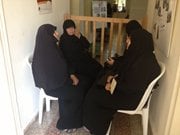
Stories of rape are many among Syrian displaced women in Lebanon. They are often stories that happened to others. Hajji Nazira is 67 years old, she speaks about what she saw in Homs, just before she fled with her family to Lebanon, that day when she went out to buy bread despite the advice of male family members and saw a woman screaming in the middle of the road “they took my daughter, they assaulted her!!”. Nazira’s voice lowers; she says she “still remembers that woman’s face”.
Syrian displaced women are haunted by stories of rape. They explain how they made sure of evacuating their daughters first: “God saved us” says Chams who fled from Baba Amr in Homs 13 months ago with her three children (two boys and a girl) and husband. Chams has a story too. While she was in Baba Amr and fleeing from one neighbourhood to the other, they stopped at her sister-in-law’s house. In that same house, a few days earlier, armed men had entered, kidnapped the neighbour’s daughter, and raped her: “the girl was 9 years old”.
Lamia is a midwife in Akkar. She delivers babies and also cleanses the bodies of deceased females, as do nurses in villages in Lebanon. She recounts how at the funeral of a Syrian women, an old Syrian displaced women, aged around 70 years old, suddenly burst into tears and started yelling hysterically. Lamia recalls how this old woman “screamed at women crying over the deceased and implored them to stop, and begged them to cry over her, as five armed men raped her in front of her husband and children, despite that she kept screaming that she was old enough to be their mother.”
Syrian women bring these stories with them. However data shows that this reality of sexual violence is not left in Syria. In Lebanon, the Child Protection in Emergencies Working Group’s assessment dated February 2013 found that in 75% of municipalities assessed; respondents reported knowledge of incidences of sexual violence towards Syrian refugees in Lebanon. Shockingly, respondents in 19% of municipalities said they knew more than 10 incidents. It identified that sexual harassment, rape, transactional sex and verbal harassment were occurring and that such it was most likely to occur on the way to the shops or school, at home and at aid distribution areas.
UNFPA equips service delivery points with kits for the Clinical Management of Rape. These kits are designed to manage the consequences of sexual violence and contain basic treatment for rape and post-exposure prophylaxis for HIV. UNFPA provides these kits to service delivery points with trained staff. Since the onset of the crisis, UNFPA Lebanon provided service delivery points with post-rape kits for possible treatment of 1,150 adults and 230 children. 74 medical staff (nurses, midwives, physicians including OB/GYN) were also sensitized on sexual violence, its consequences and its treatment.
PS: “This photo does not relate to the actual story for security and privacy purposes”


